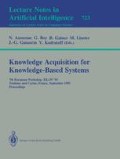Abstract
In this paper we describe an experiment in which we cast Generic Tasks into the mold provided by KEW. The result was advantageous for both GT theory and KEW-GT benefitted by being formalized, and by gaining a computer implementation. KEW benefitted by having its strategy vindicated on a new target theory, and having its software more thoroughly tested. The experiment also exposed a weakness in the KEW meta-methodology, which might have implications beyond its use in KEW.
Preview
Unable to display preview. Download preview PDF.
References
Dean Allemang. Sisyphus'91, generic tasks. In Sisyphus Working Papers Part 2: Models of problem solving, 1991.
Dean Allemang and Thomas Rothenfluh. Acquiring knowledge of knowledge acquisition: a self-study of generic tasks. In Wetter, Althoff, Boose, Gaines, Linster, and Schmalhofer, editors, Current Developments in Knowledge Acquisition, pages 353–371, 1992.
A. Anjewierden, J. Wielemaker, and C. Toussaint. Shelley — computer aided knowledge engineering. Knowledge Acquisition Journal, 4(1), 1992. Special issue: “The KADS approach to knowledge engineering”.
D. C. Brown and B. Chandrasekaran. Design Problem Solving: Knowledge structures and control strategies. Morgan Kaufmann, San Mateo, CA., 1989.
Tom Bylander and Sanjay Mittal. Csrl: A language for classifacatory problem solving. AI VII, 3:66–77, 1986.
B. Chandrasekaran. Design problem solving: A task analysis. AI Magazine, 11(4):59–71, 1990.
B. Chandrasekaran and Todd R. Johnson. Generic tasks and task structures: History, critique and new directions,. In J. M. David, J. P. Krivine, and R. Simmons, editors, Second Generation Expert Systems. Springer Verlag, 1993.
David Herman. DSPL++: A high-level language for building design expert systems with flexible use of multiple methods. PhD thesis, The Ohio State University, 1990.
John R. Josephson, Diana Smetters, Richard Fox, Dan Oblinger, Arun Welch,-and Gayle Northrup. Integrated generic task toolset. Ohio State University Tech Report, 1988.
E. Motta, T. Rajan, and M. Eisenstadt. A Methodology and Tool for Knowledge Acquisition in Keats-2. In P. Guida and G. Tasso, editors, Topics in the Design of Expert Systems, pages 265–296, Amsterdam, The Netherlands, 1989. North-Holland.
Hyacinth Nwana. Using kads and generic tasks to model a timetabling problem. In EKAW'93. Proceedings of the Seventh European Workshop on Knowledge Acquisition, 1993.
Kieron Ohara and Nigel Shadbolt. Comments on chandrasekaran. Presented at AAAI Symposium on Knowledge Level Modelling, 1992.
A. Th. Schreiber. Pragmatics of the Knowledge Level. PhD thesis, University of Amsterdam, October 1992.
N. Shadbolt and B. J. Wielinga. Knowledge based knowledge acquisition: the next generation of support tools. In B. J. Wielinga, J. Boose, B. Gaines, G. Schreiber, and M. W. van Someren, editors, Current Trends in Knowledge Acquisition, pages 313–338, Amsterdam, The Netherlands, 1990. IOS Press.
G. van Heijst, P. Terpstra, B. J. Wielinga, and N. Shadbolt. Using generalised directive models in knowledge acquisition. In Th. Wetter, K. D. Althoff, J. Boose, B. Gaines, M. Linster, and F. Schmalhofer, editors, Current Developments in Knowledge Acquisition: EKAW-92, Berlin, Germany, 1992. Springer-Verlag.
B. J. Wielinga, A. Th. Schreiber, and J. A. Breuker. KADS: A modelling approach to knowledge engineering. Knowledge Acquisition Journal, 4(1), 1992. Special issue ‘The KADS approach to knowledge engineering'.
Author information
Authors and Affiliations
Editor information
Rights and permissions
Copyright information
© 1993 Springer-Verlag Berlin Heidelberg
About this paper
Cite this paper
Allemang, D., Van Heijst, G. (1993). Generic Tasks in KEW. In: Aussenac, N., Boy, G., Gaines, B., Linster, M., Ganascia, J.G., Kodratoff, Y. (eds) Knowledge Acquisition for Knowledge-Based Systems. EKAW 1993. Lecture Notes in Computer Science, vol 723. Springer, Berlin, Heidelberg. https://doi.org/10.1007/3-540-57253-8_52
Download citation
DOI: https://doi.org/10.1007/3-540-57253-8_52
Published:
Publisher Name: Springer, Berlin, Heidelberg
Print ISBN: 978-3-540-57253-4
Online ISBN: 978-3-540-47996-3
eBook Packages: Springer Book Archive

